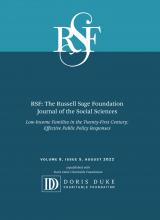Abstract
Demographic shifts over the last half-century have resulted in dramatic changes in family structure. These changes have implications for the social safety net because public assistance programs define families differently. This article focuses on a critical poverty-alleviation policy, the Earned Income Tax Credit (EITC), to document family complexity in the United States. We find that more than 60 percent of children in lower-income families reside in households with ambiguity in tax filing and thus in claiming valuable credits. Tax filing ambiguity driven by family complexity is especially common among households with Black children, highlighting significant racial inequities in the tax treatment of complex families. We also consider two reforms to reflect the realities of families today: the childless EITC and a noncustodial parent EITC.
- © 2022 Russell Sage Foundation. Michelmore, Katherine M., and Natasha V. Pilkauskas. “The Earned Income Tax Credit, Family Complexity, and Children’s Living Arrangements.” RSF: The Russell Sage Foundation Journal of the Social Sciences 8(5): 143–65. DOI: 10.7758/RSF.2022.8.5.07. Research reported in this publication was supported by the Eunice Kennedy Shriver National Institute of Child Health and Human Development (NICHD) of the National Institutes of Health under award numbers R01HD036916, R01HD039135, and R01HD040421, as well as a consortium of private foundations. The content is solely the responsibility of the authors and does not necessarily represent the official views of the National Institutes of Health. Direct correspondence to: Katherine Michelmore, at kmichelm{at}umich.edu, 735 S. State St. Ann Arbor, MI 48109, United States; Natasha Pilkauskas, at npilkaus{at}umich.edu, 735 S. State St., Ann Arbor, MI 48109, United States.
Open Access Policy: RSF: The Russell Sage Foundation Journal of the Social Sciences is an open access journal. This article is published under a Creative Commons Attribution-NonCommercial-NoDerivs 3.0 Unported License.






